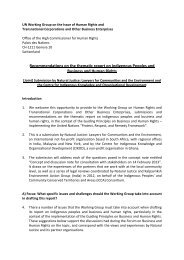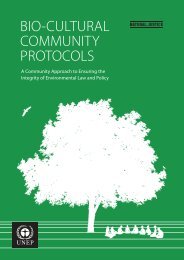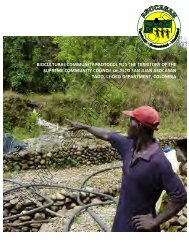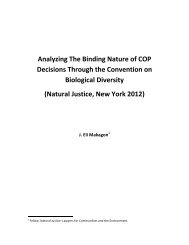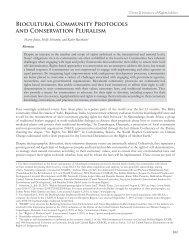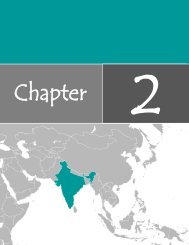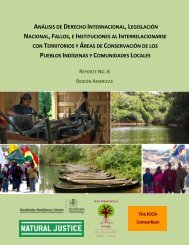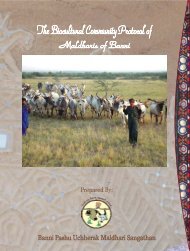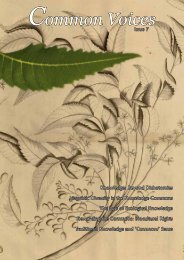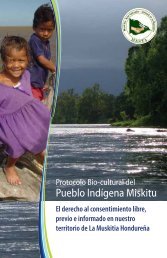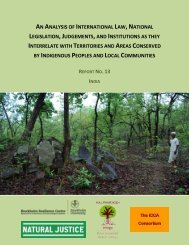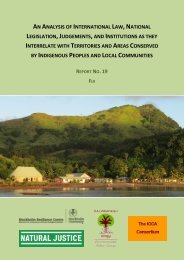English - Natural Justice
English - Natural Justice
English - Natural Justice
You also want an ePaper? Increase the reach of your titles
YUMPU automatically turns print PDFs into web optimized ePapers that Google loves.
This publication describes and analyses the interaction between Indigenous peoples’ and localcommunities’ conserved territories and areas (ICCAs) and a number of critical factors, including:international law; national legislation; judgements; institutional frameworks; social recognition;and administrative, technical, financial, and other types of support from governments, civil society,and other actors. It points to the fact that the vitality of the world’s ICCAs is inextricably linked tolarger, ongoing struggles of Indigenous peoples and local communities worldwide.In many countries, Indigenous peoples and local communities continue to face a lack of recognitionof their customary land rights, governance institutions, and/or rights over natural resources in theirterritories. At the same time, legislation and policies are developed without their full and effectiveparticipation, legal frameworks fragment otherwise connected cultural and ecological systems, andjustice systems remain largely inaccessible. Together, these factors are significantly hindering theability of Indigenous peoples and local communities to maintain the holistic integrity of theirterritories and areas.The publication concludes that Indigenous peoples’ and local communities’ stewardship of theirterritories and areas is contingent upon the legal and social recognition of, among other things:their existence and rights as distinct peoples and communities; the full extent of their territoriesand areas; customary and contemporary systems of natural resource governance andmanagement; and communal control over historically state-dominated or corporatized resourcessuch as crops, wildlife, forests, pastures, and fisheries. It is also essential for governments, NGOsand other service providers to ensure their support (including training and capacity building,financial resources, development and welfare inputs, networking, and advocacy) is adequate,appropriate, and determined and prioritized by the peoples and communities themselves.This report is based on:1. Legal Review An analysis of how international law and jurisprudence relate to ICCAs Regional overviews and 15 country level reports:o Africa: Kenya, Namibia and Senegalo Americas: Bolivia, Canada, Chile, Panama, and Surinameo Asia: India, Iran, Malaysia, the Philippines, and Taiwano Pacific: Australia and Fiji2. Recognition Study An analysis of the legal and non-legal forms of recognizing and supporting ICCAs, publishedin a forthcoming CBD Technical Series volume 19 country level reports:o Africa: Kenya, Namibia and Senegalo Americas: Bolivia, Canada, Chile, Costa Rica, Panama, and Surinameo Asia: India, Iran, the Philippines, and Russiao Europe: Croatia, Italy, Spain, and United Kingdom (England)o Pacific: Australia and FijiThe Legal Review was commissioned by the ICCA Consortium, coordinated by <strong>Natural</strong> <strong>Justice</strong> andKalpavriksh, and funded by SwedBio. The Recognition Study was commissioned by the ICCAConsortium, coordinated by Kalpavriksh, and funded by The Christensen Fund, GEF Small GrantsProgramme and SwedBio.The reports are available at: www.iccaconsortium.org.



